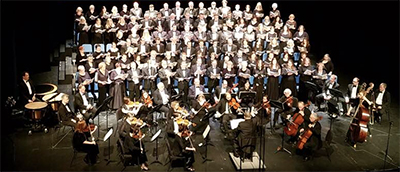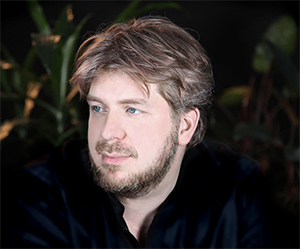by Nicholas Stevens

For the concert on April 29, 17 area high school students joined the group’s 90 regular members and a chamber orchestra to perform two musical farewells to life: one familiar, the other new. First came Mozart’s Requiem, in the standard completion by Süssmayr, followed by the world premiere of Dewdrops, a piece by three-time Tony Award Nominee and Lakewood native Dave Malloy.
In the concrete-walled Magnificat Center for the Performing Arts, individual voices and instrumental parts stood out. However, the ensemble’s sheer size ensured more than adequate blend in passages for full choir, such as the latter part of the opening Introit. The chamber orchestra tore into the iconic Sequence (“Dies irae, dies illa…”) with fierce energy. When the solo quartet stepped out during the “Tuba mirum,” bass Eric Richardson faltered for a moment but found his groove. Tenor David McCullum and mezzo-soprano Kristen Jones-Schmittigen sang gamely, but could have projected somewhat more, while soprano Debra Chelko brought confidence and great tone to her solo line.
Throughout the Sequence, timpanist Andrew Pongracz supplied a warm, beating pulse at the perfect volume. Chorale Director John Drotleff, a veteran of 34 years at the helm of the ensemble, held his players and singers together, although orchestra members occasionally seemed to miss his grander gestures. Tuning and coordination slipped a bit among the violins in the Sanctus and Agnus Dei, but the final Communion glowed, as it should.

Dewdrops sets texts by nineteen Japanese poets as well as Malloy himself. It remixes the refrain of an iconic poem by Dylan Thomas — “Do not go gentle into that good night” becomes “I will go gently.” The first movement opens with a clever blending of muted trombones and clarinets, with the singers chanting in unison only to split into dissonance and slide into harmony. The second movement gives the trumpet and trombone players, so patient throughout the Requiem, a chance to shine — and shine they did, along with the bassoons.
The highlight of the performance arrived partway through Dewdrops, when choral melodies, timpani patterns, and ever-brightening harmonies converged to form a sort of miniature Baroque-pop song. Its gentle swaying, along with texts both mundane and cosmic, made for an oddly satisfying conclusion. The luminous setting of the word “Amen” left a grateful audience ready to say the same to a visibly thrilled Malloy.
Published on ClevelandClassical.com May 7, 2018.
Click here for a printable copy of this article


